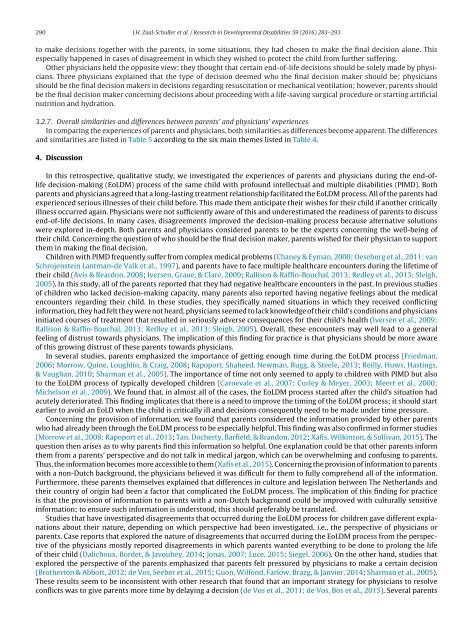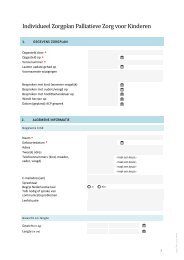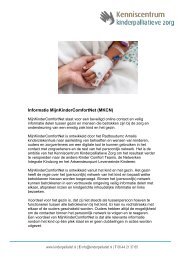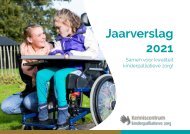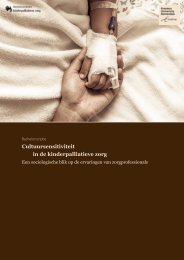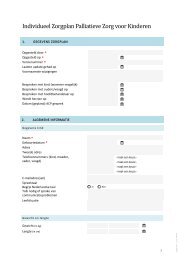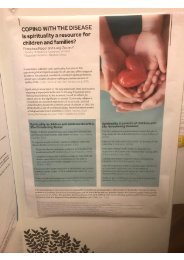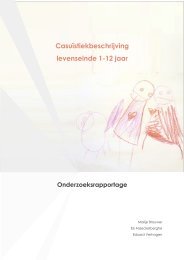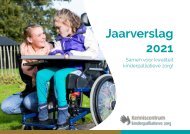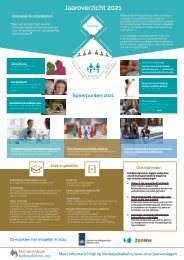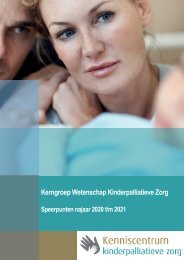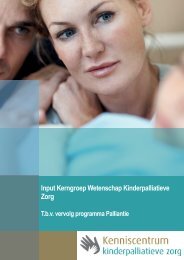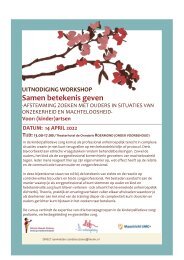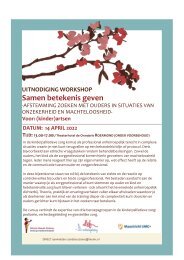How parents and physicians experience end-of-life decision-making for children with profound intellectual and multiple disabilities
Create successful ePaper yourself
Turn your PDF publications into a flip-book with our unique Google optimized e-Paper software.
290 I.H. Zaal-Schuller et al. / Research in Developmental Disabilities 59 (2016) 283–293<br />
to make <strong>decision</strong>s together <strong>with</strong> the <strong>parents</strong>, in some situations, they had chosen to make the final <strong>decision</strong> alone. This<br />
especially happened in cases <strong>of</strong> disagreement in which they wished to protect the child from further suffering.<br />
Other <strong>physicians</strong> held the opposite view; they thought that certain <strong>end</strong>-<strong>of</strong>-<strong>life</strong> <strong>decision</strong>s should be solely made by <strong>physicians</strong>.<br />
Three <strong>physicians</strong> explained that the type <strong>of</strong> <strong>decision</strong> deemed who the final <strong>decision</strong> maker should be; <strong>physicians</strong><br />
should be the final <strong>decision</strong> makers in <strong>decision</strong>s regarding resuscitation or mechanical ventilation; however, <strong>parents</strong> should<br />
be the final <strong>decision</strong> maker concerning <strong>decision</strong>s about proceeding <strong>with</strong> a <strong>life</strong>-saving surgical procedure or starting artificial<br />
nutrition <strong>and</strong> hydration.<br />
3.2.7. Overall similarities <strong>and</strong> differences between <strong>parents</strong>’ <strong>and</strong> <strong>physicians</strong>’ <strong>experience</strong>s<br />
In comparing the <strong>experience</strong>s <strong>of</strong> <strong>parents</strong> <strong>and</strong> <strong>physicians</strong>, both similarities as differences become apparent. The differences<br />
<strong>and</strong> similarities are listed in Table 5 according to the six main themes listed in Table 4.<br />
4. Discussion<br />
In this retrospective, qualitative study, we investigated the <strong>experience</strong>s <strong>of</strong> <strong>parents</strong> <strong>and</strong> <strong>physicians</strong> during the <strong>end</strong>-<strong>of</strong><strong>life</strong><br />
<strong>decision</strong>-<strong>making</strong> (EoLDM) process <strong>of</strong> the same child <strong>with</strong> pr<strong>of</strong>ound <strong>intellectual</strong> <strong>and</strong> <strong>multiple</strong> <strong>disabilities</strong> (PIMD). Both<br />
<strong>parents</strong> <strong>and</strong> <strong>physicians</strong> agreed that a long-lasting treatment relationship facilitated the EoLDM process. All <strong>of</strong> the <strong>parents</strong> had<br />
<strong>experience</strong>d serious illnesses <strong>of</strong> their child be<strong>for</strong>e. This made them anticipate their wishes <strong>for</strong> their child if another critically<br />
illness occurred again. Physicians were not sufficiently aware <strong>of</strong> this <strong>and</strong> underestimated the readiness <strong>of</strong> <strong>parents</strong> to discuss<br />
<strong>end</strong>-<strong>of</strong>-<strong>life</strong> <strong>decision</strong>s. In many cases, disagreements improved the <strong>decision</strong>-<strong>making</strong> process because alternative solutions<br />
were explored in-depth. Both <strong>parents</strong> <strong>and</strong> <strong>physicians</strong> considered <strong>parents</strong> to be the experts concerning the well-being <strong>of</strong><br />
their child. Concerning the question <strong>of</strong> who should be the final <strong>decision</strong> maker, <strong>parents</strong> wished <strong>for</strong> their physician to support<br />
them in <strong>making</strong> the final <strong>decision</strong>.<br />
Children <strong>with</strong> PIMD frequently suffer from complex medical problems (Chaney & Eyman, 2000; Oeseburg et al., 2011; van<br />
Schrojenstein Lantman-de Valk et al., 1997), <strong>and</strong> <strong>parents</strong> have to face <strong>multiple</strong> healthcare encounters during the <strong>life</strong>time <strong>of</strong><br />
their child (Avis & Reardon, 2008; Iversen, Graue, & Clare, 2009; Rallison & Raffin-Bouchal, 2013; Redley et al., 2013; Sleigh,<br />
2005). In this study, all <strong>of</strong> the <strong>parents</strong> reported that they had negative healthcare encounters in the past. In previous studies<br />
<strong>of</strong> <strong>children</strong> who lacked <strong>decision</strong>-<strong>making</strong> capacity, many <strong>parents</strong> also reported having negative feelings about the medical<br />
encounters regarding their child. In these studies, they specifically named situations in which they received conflicting<br />
in<strong>for</strong>mation, they had felt they were not heard, <strong>physicians</strong> seemed to lack knowledge <strong>of</strong> their child’s conditions <strong>and</strong> <strong>physicians</strong><br />
initiated courses <strong>of</strong> treatment that resulted in seriously adverse consequences <strong>for</strong> their child’s health (Iversen et al., 2009;<br />
Rallison & Raffin-Bouchal, 2013; Redley et al., 2013; Sleigh, 2005). Overall, these encounters may well lead to a general<br />
feeling <strong>of</strong> distrust towards <strong>physicians</strong>. The implication <strong>of</strong> this finding <strong>for</strong> practice is that <strong>physicians</strong> should be more aware<br />
<strong>of</strong> this growing distrust <strong>of</strong> these <strong>parents</strong> towards <strong>physicians</strong>.<br />
In several studies, <strong>parents</strong> emphasized the importance <strong>of</strong> getting enough time during the EoLDM process (Friedman,<br />
2006; Morrow, Quine, Loughlin, & Craig, 2008; Rapoport, Shaheed, Newman, Rugg, & Steele, 2013; Reilly, Huws, Hastings,<br />
& Vaughan, 2010; Sharman et al., 2005). The importance <strong>of</strong> time not only seemed to apply to <strong>children</strong> <strong>with</strong> PIMD but also<br />
to the EoLDM process <strong>of</strong> typically developed <strong>children</strong> (Carnevale et al., 2007; Curley & Meyer, 2003; Meert et al., 2000;<br />
Michelson et al., 2009). We found that, in almost all <strong>of</strong> the cases, the EoLDM process started after the child’s situation had<br />
acutely deteriorated. This finding implicates that there is a need to improve the timing <strong>of</strong> the EoLDM process; it should start<br />
earlier to avoid an EoLD when the child is critically ill <strong>and</strong> <strong>decision</strong>s consequently need to be made under time pressure.<br />
Concerning the provision <strong>of</strong> in<strong>for</strong>mation, we found that <strong>parents</strong> considered the in<strong>for</strong>mation provided by other <strong>parents</strong><br />
who had already been through the EoLDM process to be especially helpful. This finding was also confirmed in <strong>for</strong>mer studies<br />
(Morrow et al., 2008; Rapoport et al., 2013; Tan, Docherty, Barfield, & Br<strong>and</strong>on, 2012; Xafis, Wilkinson, & Sullivan, 2015). The<br />
question then arises as to why <strong>parents</strong> find this in<strong>for</strong>mation so helpful. One explanation could be that other <strong>parents</strong> in<strong>for</strong>m<br />
them from a <strong>parents</strong>’ perspective <strong>and</strong> do not talk in medical jargon, which can be overwhelming <strong>and</strong> confusing to <strong>parents</strong>.<br />
Thus, the in<strong>for</strong>mation becomes more accessible to them (Xafis et al., 2015). Concerning the provision <strong>of</strong> in<strong>for</strong>mation to <strong>parents</strong><br />
<strong>with</strong> a non-Dutch background, the <strong>physicians</strong> believed it was difficult <strong>for</strong> them to fully compreh<strong>end</strong> all <strong>of</strong> the in<strong>for</strong>mation.<br />
Furthermore, these <strong>parents</strong> themselves explained that differences in culture <strong>and</strong> legislation between The Netherl<strong>and</strong>s <strong>and</strong><br />
their country <strong>of</strong> origin had been a factor that complicated the EoLDM process. The implication <strong>of</strong> this finding <strong>for</strong> practice<br />
is that the provision <strong>of</strong> in<strong>for</strong>mation to <strong>parents</strong> <strong>with</strong> a non-Dutch background could be improved <strong>with</strong> culturally sensitive<br />
in<strong>for</strong>mation; to ensure such in<strong>for</strong>mation is understood, this should preferably be translated.<br />
Studies that have investigated disagreements that occurred during the EoLDM process <strong>for</strong> <strong>children</strong> gave different explanations<br />
about their nature, dep<strong>end</strong>ing on which perspective had been investigated, i.e., the perspective <strong>of</strong> <strong>physicians</strong> or<br />
<strong>parents</strong>. Case reports that explored the nature <strong>of</strong> disagreements that occurred during the EoLDM process from the perspective<br />
<strong>of</strong> the <strong>physicians</strong> mostly reported disagreements in which <strong>parents</strong> wanted everything to be done to prolong the <strong>life</strong><br />
<strong>of</strong> their child (Dalichoux, Bordet, & Javouhey, 2014; Jonas, 2007; Luce, 2015; Siegel, 2006). On the other h<strong>and</strong>, studies that<br />
explored the perspective <strong>of</strong> the <strong>parents</strong> emphasized that <strong>parents</strong> felt pressured by <strong>physicians</strong> to make a certain <strong>decision</strong><br />
(Brotherton & Abbott, 2012; de Vos, Seeber et al., 2015; Guon, Wilfond, Farlow, Brazg, & Janvier, 2014; Sharman et al., 2005).<br />
These results seem to be inconsistent <strong>with</strong> other research that found that an important strategy <strong>for</strong> <strong>physicians</strong> to resolve<br />
conflicts was to give <strong>parents</strong> more time by delaying a <strong>decision</strong> (de Vos et al., 2011; de Vos, Bos et al., 2015). Several <strong>parents</strong>


